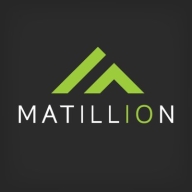

Denodo and Matillion ETL are leading products in the data management and integration sector. Denodo takes the edge in advanced data virtualization, whereas Matillion stands out for its user-friendly ETL processes.
Features: Denodo provides a strong virtualization layer ideal for managing different data sources without moving them. The platform enhances data governance and transformation. Its adaptability and integration capabilities amplify its usability. On the other hand, Matillion ETL's standout features include excellent compatibility with AWS, a drag-and-drop interface, and robust scheduling capabilities, making it user-friendly and efficient in managing data transformations and pipelines.
Room for Improvement: Denodo needs improved data catalog functionalities and better UX design for more external tools like AWS and GCP. Users find scaling it challenging, along with documentation inefficiencies. Meanwhile, Matillion ETL can enhance integration with a broader range of data sources, optimize user interface efficiency, and offer enhanced support for concurrent workloads. Both solutions could benefit from expanded integration options to improve support and documentation.
Ease of Deployment and Customer Service: Denodo offers versatile deployment options across on-premises, hybrid, and cloud settings, though customer service reviews are mixed, with some finding customer interactions cumbersome. Matillion ETL focuses on cloud-based deployment via AWS Marketplace, providing users with a convenient and manageable experience. While Matillion's support is praised for its responsiveness, both platforms can enhance user education and training to streamline deployment.
Pricing and ROI: Denodo's pricing is generally considered high, tied to CPU usage, yet it delivers notable ROI through efficiency gains. The pricing remains a concern for some. Matillion's consumption-based pricing model charges per running hour, being flexible and potentially cost-effective. Matillion is considered moderately priced and offers scalability through AWS. Each has shown positive ROI, with Denodo excelling in efficiency improvements and Matillion in adaptive pricing strategies that fit diverse needs.
Denodo's customer support team is very competent and responsive.
They have a good methodology for learning how to use the tool.
They are proactive in conducting webinars and connecting with customers.
Its complexity in configuring and the requirement to install different connectors for different sources affects its scalability.
While the solution scales well on a single machine, I have doubts about its scalability when deployed as part of a Java component cluster.
If JVM does not function properly, it may cause Denodo to fail to connect to different sources.
I would rate it nine out of ten because it is very reliable, always performing as expected.
Ensuring data caching is up to date is critical.
The system has dependencies on other environments, like JVM, which can affect its performance.
Denodo needs better communication on how the product can be deployed for specific solutions.
Denodo is considered pricey, limiting its use to large enterprises or government organizations that can afford its comprehensive setup.
Denodo's pricing is not affordable for small companies and is more suitable for medium to large enterprises.
Denodo's ability to connect to multiple data sources and perform extract-transform-load (ETL) operations on the fly is noteworthy.
The most valuable feature of Denodo is its uniformity of self-site data access types, which allows it to connect to almost any storage technology and feed it transparently.
Its catalog is useful for data governance and helps document information for databases and fields.


Denodo is a leading data integration, management, and delivery platform that uses a logical approach to enable data science, hybrid and multi-cloud data integration, self-service BI, and enterprise data services. Organizations of different sizes across various industries utilize the product to get above the data silos. The solution offers organizations the freedom to migrate data to the cloud, or logically unify data warehouses and data lakes, without affecting business. This can ultimately result in the evolution of data strategies.
The platform accelerates data provisioning through reduced data replication, provides business users the freedom to select their preferred applications, and enables consistent security and governance across multiple systems. The solution offers one of the leading logical data fabric solutions by initiating data virtualization and eliminating the complexity and exposing the data in business-friendly formats.
Denodo also offers modern data integration and management for hybrid and multi-cloud environments for Denodo Platform for Cloud. This service can be purchased through the bring-your-own-license (BYOL) option. Users seeking faster deployment can license the product to popular cloud providers, including Amazon AWS, Google Cloud Platform, and Microsoft Azure. The solution integrates, manages, and delivers data in complex environments with high performance, governance, and security. It also offers additional solutions, such as the Denodo Platform for Cloud Modernization, the Denodo Platform for Cloud Data Integration, and the Denodo Platform for Cloud Analytics, which overcome common cloud data challenges.
Denodo Features
At the beginning of 2022, version 8.0 of Denodo introduced several new key features of the platform. These include:
Denodo Benefits
Denodo offers various benefits for its users through its services. Some of the greatest advantages of using this platform include:
Reviews from Real Users
Naresh M., a senior application developer at a financial services firm, appreciates Denodo because it offers quick and simple web services creation.
Alisson M., a senior BigData DevOps engineer at Schaeffler, says that Denodo is great for queries and scouting data.
Matillion ETL is a powerful tool for extracting, transforming, and loading large amounts of data from various sources into cloud data warehouses like Snowflake. Its ability to load data dynamically and efficiently using metadata is a standout feature, as is its open-source ETL with good performance and high efficiency.
The solution has a graphical interface for jobs, is easily adjustable and extensible, and allows for scheduling and error reporting. Matillion ETL has helped organizations move to a cloud-based solution, bridge the gap between on-premises and on-cloud, and perform complex migration projects.
We monitor all Cloud Data Integration reviews to prevent fraudulent reviews and keep review quality high. We do not post reviews by company employees or direct competitors. We validate each review for authenticity via cross-reference with LinkedIn, and personal follow-up with the reviewer when necessary.